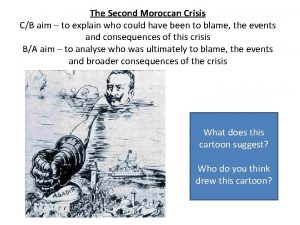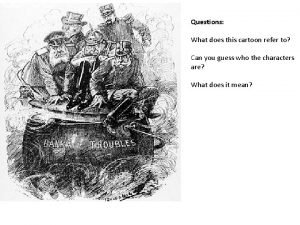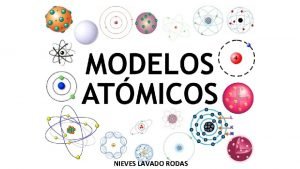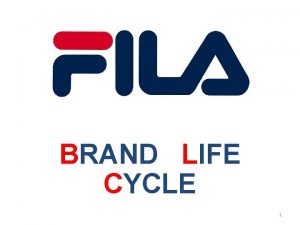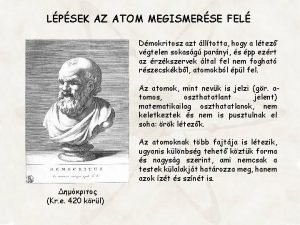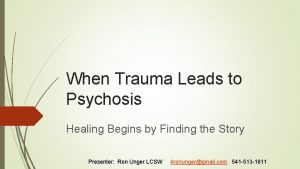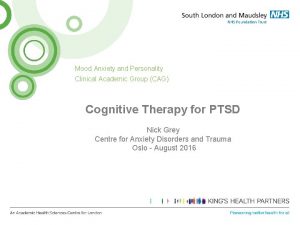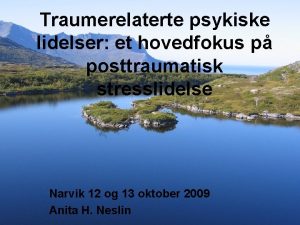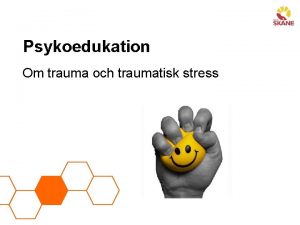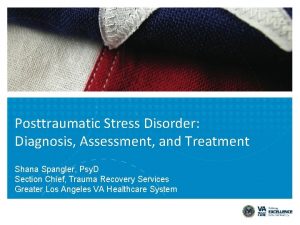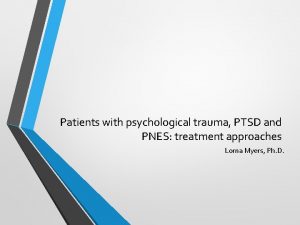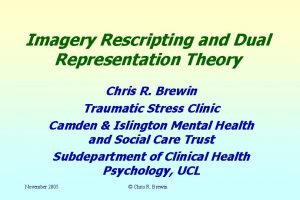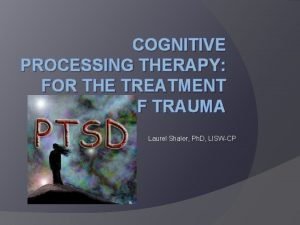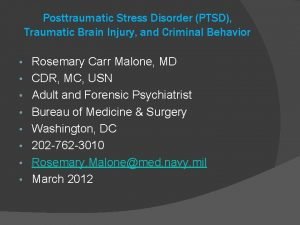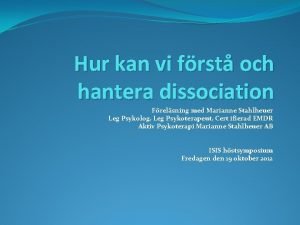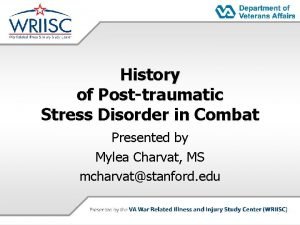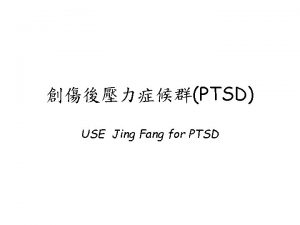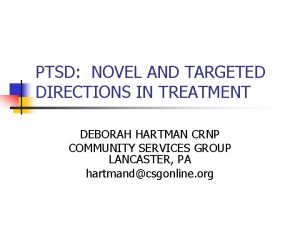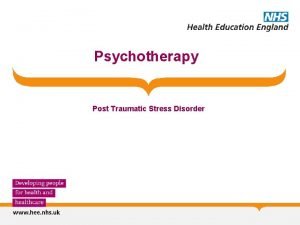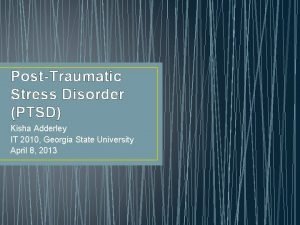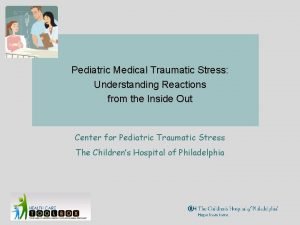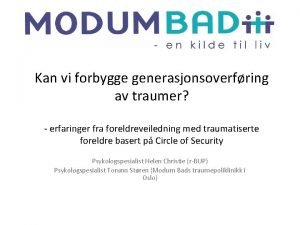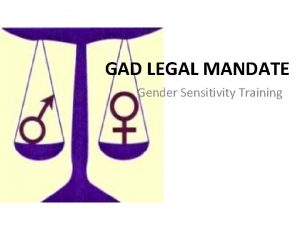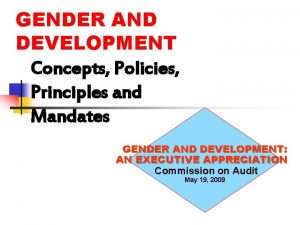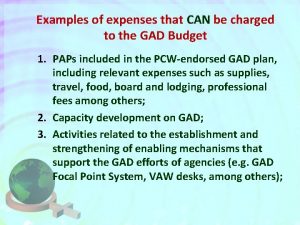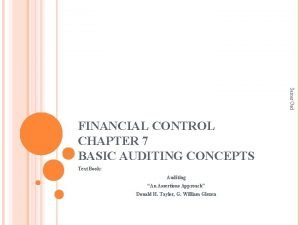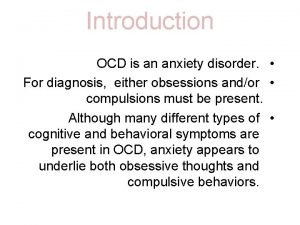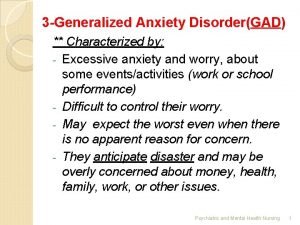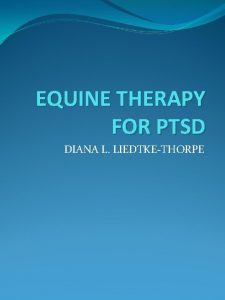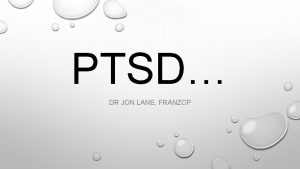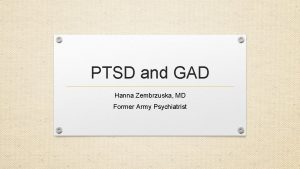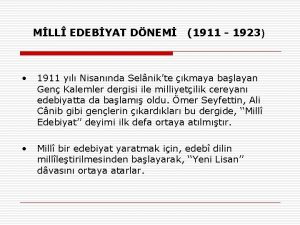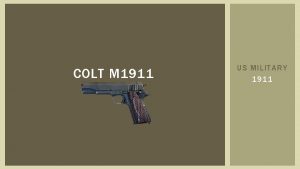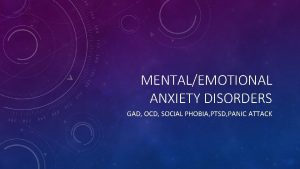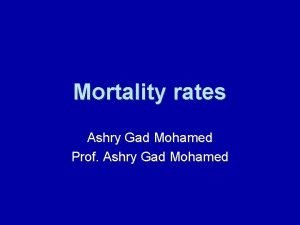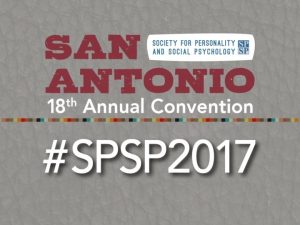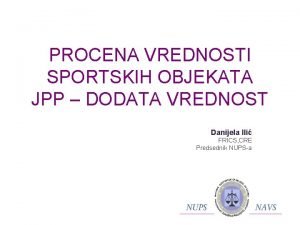PTSD and GAD Linda Madson MD 1911 JPP







































- Slides: 39

PTSD and GAD Linda Madson MD 1911 JPP 3 -6306

Objectives What are PTSD/GAD? ¡ Who gets them and why? ¡ How do we treat them? ¡

Case Study ¡ ¡ ¡ 23 yo male veteran 2 tours, Iraq and Afganistan, squad leader second tour, infantry, mortared multiple times but only felt blast wave 2 -3 times, IED threw pt from vehicle and broke arm 10 months ago, pt still in the army but being “let out on a medical” Now student at U of I Presents to Student Health for arm pain at the old injury 2 weeks into the semester. Poor eye contact, guarding arm, does not sit in the usual chair by the window. Watches window and door a lot. Stands up early into interview apologizes for wasting time and growls “It’s Ok, there isn’t anything anyone can do” and prepares to leave.

Your are covering the clinic Do you just let him go? ¡ What history do you want ¡ What do you want to know about the arm ¡ What social hx is important ¡ Do you care about how school is going for him? ¡

What is PTSD? Post- Traumatic Stress Disorder- a debilitating psychological reaction to a horrifying/life threatening event where the pt felt helpless and personally involved. Distinct among psychiatric illnesses as it requires a clear etiologic factor (though “adjustment reactions also require a change typically) New Diagnosis/name, old disease- Shell shock, Soldier’s heart, Battle Fatigue, accident neurosis, Post-rape syndrome

What is PTSD? ¡ Trauma

What is PTSD? Reexperiencing Classic Triad Avoidance Hyperarousal

Who gets PTSD and why? ¡ Survivors of traumatic events, intentional, accidental, or natural disaster(ie tsunami) ¡ Witnesses of these events esp when they see others injured by that event ¡ People who learned of the event affecting someone very close to them (violent or accidental event) ¡ People who have repeated or extreme exposure to the after effects of those events (ie police who work on child abuse cases, health care workers)

Who gets PTSD and why? Genetics? ? ¡ Biologic factors ¡ l Amygdala

Who gets PTSD and why? ¡ Psychosocial factors l l Gender Type and severity of trauma Prior trauma Psychopathology

How do we treat PTSD? ¡ Psychotherapy l l l Cognitive Behavioral Therapy (CBT) Eye movement desensitization and reprocessing (EMDR) Exposure Therapy Group Therapy Family Therapy Medications- SSRI’s, Prazosin ¡ BEWARE ¡ l Classic self medicators- ETOH, Benzo’s-

How do we treat PTSD? ¡ Pharmacologic l l l First line: SSRI’s Second line: Venlafaxine, mirtazipine Third line: MAOI’s, TCA’s Nightmares: Clonidine, Prazosin Irritability: Mood stabilizers

How do we treat PTSD? ¡ Psychotherapy l l CBT (exposure and desensitization) Group therapy Interpersonal therapy EMDR (Eye movement desensitization and reprocessing)

What is GAD?

What is Generalized Anxiety Disorder (GAD)? ¡ Polysymptomatic picture l l Worry- 6 months, excessive, uncontrolled, with at least 3 of the following 1. Feeling wound-up, tense, or restless 2. Easily becoming fatigued or worn-out 3. Concentration problems 4. Significant tension in muscles 5. Irratability 6. Difficulty with sleep Not part of other illness or substance abuse Clinically significant distress (affecting life and/or function)

Who gets GAD and why? ¡ ¡ ¡ Student health clinic again: 19 yo female, 3 rd visit for abdominal pain Pain not bad at that time but “I worry a lot about it. I can’t concentrate in class!” Negative pregnancy test last week and notes from that time indicated the hymen was intact. Pt denies any sexual activity and adds “I get to nervous to talk to men” She doesn’t want another pelvic exam and doesn’t want a narcotic to cover the pain- she wants “A cat scan or MRI thing so I know what this is!”

Continued ¡ ¡ ¡ Restless, and alternating between being overly well behaved and then bursting out an anxious question or comment. Choppy but frequent eye contact You feel anxious talking to her and begin to consider unlikely catostrophic diagnoses What else to you ask about at your walk in clinic appt with people in the waiting room? What labs and imaging do you consider? How much pressure to you put on her to do a pelvic exam?

Who gets GAD and why? 5% lifetime prevalence ¡ > 2: 1 ¡ Genetics ¡ Comorbidity ¡ l l Rule –up to 90% MDD, Social phobia

How do we treat GAD? ¡ Pharmacologic l l SSRI’s—paroxetine, escitalopram, sertraline SNRI’s—venlafaxine, duloxetine Buspirone Benzodiazapines

How do we treat GAD? ¡ Psychotherapy l l l CBT Relaxation Biofeedback

Take home points Many faces of PTSD ¡ Classic triad of PTSD ¡ Comorbidity of GAD ¡







What is PTSD? Trauma ¡ Reexperiencing ¡ Avoidance ¡ Hyperarousal ¡


Yehuda, NEJM, 2002

Who gets PTSD and why? ¡ HPA Axis derangement l l Exaggerated cortisol response to stress Exaggerated dexamethasone suppression response High CRH at rest Low cortisol at rest?

Who gets PTSD and why? ¡ Resilience l l l Internal locus of control Strong social support “Hardiness”

Who gets GAD and why? ¡ Neurotransmitter systems implicated l l l GABA via BZD receptor Norepinephrine NMDA receptor Cholecystokinin neurons Serotonin CRH

Do patients get better? ¡ Management tips: l l l Reassurance! Regular appointments Limit specialist referrals Insist on therapy Doctor patient relationship

Summary What are PTSD/GAD? ¡ Who gets them and why? ¡ How do we treat them? ¡ Do patients get better? ¡

Do patients get better?

Do patients get better? Chronic ¡ Symptom relief ¡

Do patients get better?

Do patients get better? ¡ Chronic relapsing, remitting
 Jpp moe
Jpp moe The second moroccan crisis (1911)
The second moroccan crisis (1911) Moroccan crisis cartoon
Moroccan crisis cartoon Modelo atomico dalton
Modelo atomico dalton Niagara falls frozen 1911
Niagara falls frozen 1911 Revelation 19
Revelation 19 Ireland 1911
Ireland 1911 Ireland 1911
Ireland 1911 1911 1988
1911 1988 Fila heritage 1911
Fila heritage 1911 Atommodell 1911
Atommodell 1911 Moroccan crisis 1911
Moroccan crisis 1911 Psychosis and ptsd
Psychosis and ptsd Ptsd model ehlers and clark
Ptsd model ehlers and clark Wid approach
Wid approach Ptsd norsk
Ptsd norsk Macbeth ptsd quotes
Macbeth ptsd quotes Psykoedukation ptsd
Psykoedukation ptsd Va ptsd rating scale pdf
Va ptsd rating scale pdf Ptsd seizures
Ptsd seizures Dual representation theory ptsd
Dual representation theory ptsd Ptsd spiritual warfare
Ptsd spiritual warfare Cpt stuck points examples
Cpt stuck points examples The not dead remains
The not dead remains Ptsd violent behavior
Ptsd violent behavior Komplex ptsd dissociation
Komplex ptsd dissociation Evolution of ptsd
Evolution of ptsd Ptsd
Ptsd Ptsd
Ptsd Cptsd vs ptsd
Cptsd vs ptsd Causes of ptsd
Causes of ptsd Ptsd stages
Ptsd stages Kompleks ptsd trigger
Kompleks ptsd trigger Circumcision ptsd
Circumcision ptsd Thank you for listening
Thank you for listening Gad goals
Gad goals Budgetü
Budgetü Gad accounting
Gad accounting Ego-dystonic example
Ego-dystonic example Gad diagnosis
Gad diagnosis

